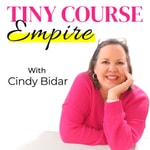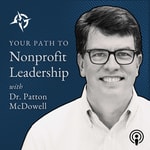Tiny Course Empire Podcast – Details, episodes & analysis
Podcast details
Technical and general information from the podcast's RSS feed.

Tiny Course Empire Podcast
Cindy Bidar
Frequency: 1 episode/9d. Total Eps: 145

Recent rankings
Latest chart positions across Apple Podcasts and Spotify rankings.
Apple Podcasts
🇬🇧 Great Britain - marketing
03/05/2025#79🇨🇦 Canada - marketing
15/11/2024#67🇬🇧 Great Britain - marketing
12/09/2024#96
Spotify
No recent rankings available
Shared links between episodes and podcasts
Links found in episode descriptions and other podcasts that share them.
See all- https://chat.openai.com/
704 shares
- https://zoom.us/
664 shares
- https://asana.com/
499 shares
- https://medium.com/
379 shares
- https://medium.com
34 shares
- https://amzn.to/393UNBh
1 share
- https://amzn.to/3mQQ0cJ
1 share
- https://amzn.to/3kJCJSA
1 share
RSS feed quality and score
Technical evaluation of the podcast's RSS feed quality and structure.
See allScore global : 73%
Publication history
Monthly episode publishing history over the past years.
How long does it take to create a digital course?
Episode 123
lundi 9 septembre 2024 • Duration 00:00
Parkinson’s Law states that work expands to fill the time available. For course creators, nowhere is this more true than in the launching of a new course.
I’ve seen creators spend months or even years planning and developing a single course. They start with the best of intentions, but with no milestones to aim for and endless time available, progress—ironically—slows to a crawl.
I spent several months creating my first digital course. That was far longer than I intended it to take, and a big part of the problem was that I didn’t have a timeline to follow. I didn’t know that I needed to compartmentalize my tasks to keep from muddying the project waters. I didn’t know how to prevent scope creep—or how badly it could derail my progress. I didn’t know the importance of single-tasking.
Fast forward a few years and a few dozen completed courses, and I now have a plan that lets me create a brand new course in four weeks or less, without the backtracking, overwhelm, and rabbit trails that can make a product launch take longer than necessary.
I’m sharing my course creation timeline with you in this week’s episode, so you can make Parkinson’s Law work for you instead of against you.
Prefer a transcript? Here you go!
What you’ll learn in this episode:
- My tried-and-true four-week course creation plan
- Three reasons why creating a course takes longer than you want it to (and how to fix it)
- How to make adjustments to the timeline to match your course-creation style
- Why I write the sales page first
Resources mentioned:
- Six-Figure Systems is my monthly program where I share everything I know about building and growing a digital course business. Start today for just $7 for your first week.
- Tiny Course Empire is my strategy for building a multiple-six-figure course business, one tiny course at a time.
- Six Ways to Validate Your Course Idea will help you decide if your course idea has legs, or if it’s a waste of your time.
- Quick & Easy Course Creation offers up the step-by-step process to follow to take your course from idea to finished in record time.
How to Price a Digital Course
Episode 122
lundi 2 septembre 2024 • Duration 00:00
Pricing your digital course is surprisingly stressful.
Charge too little, and you might end up feeling resentful about all the work you put into your training only to be “giving it away for practically nothing.” Price it too high, and you might feel self-conscious about it. Who do you think you are, anyway?
So we try to apply some logic. We try to math, but when it comes to digital goods, math doesn’t work either. There’s no additional cost involved in delivering one more video download or one more PDF, so we can’t multiply the cost of goods sold by our markup to arrive at a retail price.
What’s the answer then? Well, it’s one part art, one part intuition, with a dash of espionage and just a hint of a power pose thrown in for flavor.
We’ll get into all the ins and outs of how to price a digital course in this episode of the Tiny Course Empire Podcast.
Prefer a transcript? Here you go!
What you’ll learn in this episode:
- What I discovered about pricing while managing a gas station.
- Two reasons low-cost products and courses might be more trouble than they’re worth.
- Where not to land on the pricing scale (here there be dragons).
- The surprising element that can dramatically increase what potential students are willing to pay for your course.
Resources mentioned:
- My CLEAR Framework offers a step-by-step strategy for building a digital business from the ground up. When you’ve worked through the Framework, pricing your online course becomes much easier.
- The Framework Formula turns what you know into what you’re known for, which in turn opens the door to premium pricing for every course you create.
- Six-Figure Systems is my monthly training program where we talk strategy, pricing, marketing, and all things digital course creation. Start a 7-day, all-access trial today for just $7.
- Peter Boyle’s $1 Product Challenge offers a great reason to create an ultra-low-cost product.
- Tiny Course Empire focuses on creating a library of small courses you can leverage in a variety of ways.
Amy Kuphal’s easy email marketing strategy
Episode 113
jeudi 13 juin 2024 • Duration 00:00
You’ve listened to me bang on about email marketing for a few years now. You know how important it is (crucial, in fact). You know how much I prioritize email above all other marketing channels (because it’s the only one you own and control). You know my thoughts on list-building and engagement and staying in touch with your subscribers.
And I know that for some of you, my email marketing method feels a bit overwhelming—especially if you’re just getting started.
That’s why when I met Amy Kuphal, I knew I had to introduce her to you. Amy is an email marketing ninja, but more than that, she’s a systems lover, and she wants nothing more than to make email marketing easy for everyone to do.
Prefer a transcript? Here you go!
Join me for this interview, and you’ll learn:
- How Amy discovered the power of email marketing
- How Amy’s Lead Generation Pyramid works to grow your mailing list
- How an email list allowed Amy to scale her 1:1 coaching business while working fewer hours
- Why you should sell to your email subscribers first, and how Amy does it with integrity
- The most important part of your lead magnet (this one caught me off guard)
- Why launching your lead magnet fast is more important than making it perfect
- Where to promote your lead magnet with some creative ideas you’ve probably never thought of
- How to turn new subscribers into raving fans with a short welcome sequence
- How Amy is using AI in her email marketing content
- How to make writing a weekly newsletter easy with Amy’s email templates
Resources mentioned:
- Amy Kuphal, email marketing specialist and online business coach
- The Inbox Entrepreneur
- Six-Figure Systems (snap up a $7 trial here)
Marketing Without Social Media
Episode 23
jeudi 6 janvier 2022 • Duration 00:00
It’s not a secret that organic reach on Facebook, Instagram and others is at an all time low. What’s worse, even if you’ve mastered a platform or two, it seems as if every week or so, there’s yet another algorithm update that threatens to destroy all the work you’ve put into it.
Pinterest users are even feeling the pinch. The platform is often referred to as a search engine rather than a social network, and as such it’s been the go-to traffic source for bloggers in many niches for years. But now, even Pinterest has left some content creators feeling frustrated over a dramatic drop in traffic.
But what can you do? How else can you get the word out about your latest course, or your new opt-in offer? Turns out, there are plenty of ways you can market your business without social media, and in this week’s episode, I’ll give you my top 21 suggestions.
Prefer a transcript? Here you go!
What you’ll learn in this episode:- Why I finally (mostly) left social media, and how I’m making Facebook work on my terms today.
- The single most important marketing channel all small business owners should be prioritizing, and why.
- How to leverage search (and not just from Google) to get in front of your ideal audience.
- The strategy I used to launch my business and quickly grow to six-figures in revenue.
- What Steve Martin can teach us all about getting noticed in a competitive world.
- Debbie Gartner’s SEO guides are worth every penny. Start with this one if you’re brand new, or this one if you’ve been blogging for a while.
- Stupid Simple SEO is the best full-featured course on SEO I know of. I took it two years ago and it’s well worth the time and money investment. Start with Mike’s free class to learn more about the topic and his teaching style.
- Affiliate Program Success was not mentioned, but it’s a helpful resource if you’re interested in creating your own affiliate program to sell your courses and products.
- Medium.com has a built in audience and it’s easy to get started syndicating your content there.
- HelpAReporter.com is a great resource if you want to get quoted on high-traffic sites. Sign up as a “source” and then choose the types of notifications to receive.
- Meetup.com makes live, in person networking easier. Just search your area for your topics of interest.
- UpViral makes hosting a viral contest as simple as filling in a few details.
- Steve Martin has the best advice you will ever hear about finding success, and it’s not just true for show business.
- In episode eight I talked more about participating in bundles and giveaways for list building.
22 Tips for a More Successful 2022
Episode 22
jeudi 30 décembre 2021 • Duration 00:00
This is the final episode before we kick off a brand new year. And since this is episode 22, I thought it was only fitting that we celebrate with 22 ways we can all have a more successful 2022.
Whether you’re a course creator, a coach, or a digital product seller, and even if you’re just starting out on your business journey, you’ll find something here to kick off the new year with purpose.
Here’s to a fantastic year for us all.
Prefer a transcript? Here you go!
What you’ll learn in this episode:- How taking better care of your mind and your body can make a difference in your business results, too.
- Why you should say “no” more often.
- Why you might be “failing ahead of time” and what to do instead.
- How digital (and physical) clutter causes stress and wasted time.
- How to let things go and feel good about it.
- How the simple act of tracking your KPIs can dramatically improve your business.
- The number one thing you can to do increase your income and audience reach this year.
- The Intentional Inbox: This free resource from Kelly McCausey will change how you do email.
- Organizational Mastery for Online Entrepreneurs: I taught this workshop live, and the replay is now a part of the Six-Figure Systems membership.
- Sunk costs fallacy: The human tendency to put more effort, time, or money into a failing project, simply because we’ve already invested so much.
- How to Be Consistent: Being consistent is far more important than being a brilliant marketer or having a great business mind.
- A Year of Yes: Shonda Rhimes’ bestseller about saying yes to more opportunities. I’m saying no instead, and I talk about that here.
- How Cal Newport reads five books every month.
- Rescue Time, Toggl, and Clockify: Tools I’ve used to track my time.
- Tips for adding more passive income to your business.
- “… It’s not like if you don’t take action you’re reducing your risk of failure. You’re just failing ahead of time.” Brook Castillo, the Life Coach School Podcast.
7 Ways Time Tracking Helps You Build a Better Business
Episode 21
jeudi 23 décembre 2021 • Duration 00:00
I know, I know.
You didn’t quit that soul-sucking day job just so you could punch a time clock every day in your own home office. Believe me, I get it.
I’ve said many times over the years that the best part of quitting my job was that I got to turn the alarm clock off* on a (more or less) permanent basis.
But here’s what else I know about you.
You want to be more efficient and productive, so you can work fewer hours. You want to earn more while working less. And you definitely want to hand off those projects and tasks that aren’t the best and highest use of your time.
Tracking your time can give you all of those benefits and more, so in this episode of the Tiny Course Empire Podcast, I’m challenging you to get out a timer and track your work hours, even if only for a week.
I’ll give you all my tips for tracking effectively including what tools to use and what exactly you should be tracking.
Prefer a transcript? Here you go!
What you’ll learn in this episode:- Why I recommend you track your own time, but not your team members
- The number one benefit I personally see when I track where I spend my time
- My favorite free tools to use for tracking time
- Three time-tracking methods to try
- What to track, and how to use the information to make better business decisions
- Rescue Time: This automated tracking system is great for people who forget they have a timer running, but it won’t track everything.
- Toggl: Simple, free, and it features great reporting.
- Timery: This iPhone app offers a really useful interface for Toggl.
- Clockify: I love that this one integrates with my to-do list manager.
- My favorite notebook: Manual time tracking in a beautiful notebook isn’t as painful as it might seem.
- Pricing calculator and video: Play with some numbers here to see how time tracking impacts your business.
* Except I do still get up with an alarm clock, because I find I’m much more productive at 5 AM than I am in the afternoons. That’s something I discovered through tracking my time.
My time tracking grid in a favorite notebook.3 Easy Ways to Earn Passive Income in Your Business
Episode 20
jeudi 16 décembre 2021 • Duration 00:00
Warren Buffett famously said, “If you don’t find a way to make money while you sleep, you will work until you die.”
For online business owners, that means finding ways to earn passive income. While we all know that there are very few truly passive income options, there are a lot of ways to leverage our time and energy to earn more from work we’ve already done.
In this episode, I’m sharing three easy ways you can start leveraging your efforts and yes, even make money while you sleep.
Prefer a transcript? Here you go!
What you’ll learn in this episode:- Why most passive income isn’t really passive at all—and why you should still make it a priority in your business.
- Five ideas for using automation to increase your passive income.
- Three ways to leverage time and assets to create more passive income.
- How to profit from other people’s work, and even how to give things away for free and make money with them.
- Tiny Course Empire teaches you how to build a catalog of small courses you can mix, match, and endlessly repurpose.
- Making Money With Freebies is Karon Thackston’s guide to giving away free stuff and profiting from it. Use code MMWF to save $10 at checkout.
- WP Popups lets you put sale notifications anywhere on your website.
How to Be Consistent
Episode 19
jeudi 9 décembre 2021 • Duration 00:00
What’s one thing that sets successful business owners apart from those who struggle to gain traction?
It’s not better tools or more education.
It’s not more influential friends or a more profitable niche.
It’s not even about your skill level.
Being successful in business requires one thing above all else: Consistent action.
But showing up consistently is hard. There are so many other things competing for our attention every single day.
Family and friends we want to spend time with. Never-ending projects around the house. (“Why hello laundry. Again.”) An entire parade of appointments to be made and rescheduled and eventually kept.
And all of that before you can even think about “me” time.
Taking consistent action in your business can feel downright impossible in the face of everything else you’ve got going on.
It doesn’t have to be though. Not when you have a plan.
Prefer a transcript? I gotcha covered right here.
What you’ll learn in this episode:- Why you get to define what consistency looks like in your business (with just a tiny caveat).
- Why trying to maintain consistency doing something you hate is never going to work.
- How to set yourself up for success just by paying attention to your personality and work habits.
- How to make it easy to be consistent.
- How to shift the way you think about your business so it becomes nearly impossible not to show up consistently.
- Kevin Whelan writes a daily email newsletter all about marketing. I enjoy reading it, and I think you might, too.
- The Notion Nerds are a not-safe-for-work podcasting team who chat about productivity, project management, and (of course) Notion. You’ll find them on YouTube and in your favorite podcast app.
- Deep Work: Rules for Focused Success in a Distracted World by Cal Newport. Famous for his avoidance of social media and even email (gasp!) Cal Newport makes the case that success is easier when you’re less distracted and more able to go deep on what really matters.
- How to Achieve Every Goal is the episode where I talk about, well, how to achieve the goals you set for your business or your life. It’s not that hard to do when you have a plan to follow.
How to achieve every goal
Episode 18
jeudi 2 décembre 2021 • Duration 00:00
It’s that time of year again. A brand new, shiny calendar is just around the corner, and that means it’s time to set some goals.
THIS is the year you’ll finally lose weight, get fit, start a blog, write a book, launch a YouTube channel, organize your house, quit your job, learn to knit…
All. The. Things.
Sound familiar? There’s just one problem.
Setting goals is easy. Achieving them requires an entirely different skill set.
In this episode of the Tiny Course Empire Podcast, I’m breaking down exactly what it takes to achieve every goal you set. Whether you want to launch an empire or organize your photos, there’s a formula to follow.
So come on along, and let’s get goaling!
Prefer a transcript? I gotcha covered right here!
What you’ll learn in this episode:- The one element of SMART that you must get clear on if you want to actually achieve your goals.
- Two must-have pieces that make up every successful achievement.
- The real reason to write down your goals and keep them handy.
- How to avoid setting yourself up for failure.
- Why tracking your progress sucks sometimes, and why you should do it anyway.
- SMART goals: What they are and where they came from, courtesy of Wikipedia.
- Atomic Habits: An Easy & Proven Way to Build Good Habits & Break Bad Ones: James Clear’s popular book about, well, habits.
- Tiny Habits: The Small Changes That Change Everything: Not mentioned in the episode, but this book by BJ Fogg is filled with practical tips on creating and sticking to new habits.
- Habit tracking in chart form: Some days I find my weight tracker inspiring. Some days, not so much. But the habit of doing it definitely helps to keep my goals front of mind.
- Goal achieving worksheet: Brainstorm ideas, create projects and tasks, and track the whole process from start to ultimate completion.
How to Use Google Alerts to Grow Your Business
Episode 17
mercredi 24 novembre 2021 • Duration 00:00
There are all kinds of pricey tools you can invest in as a small business owner, but one of the most useful is the free Google Alerts.
In this episode, we’re digging into what Google Alerts do, how to set them up, and some ways you can use them to not only grow your business, but protect your online assets as well.
Prefer a transcript? Here you go!
What you’ll learn in this episode:- Why Google Alerts is a must-have tool for anyone looking for more search engine love.
- How to find potential affiliates and JV partners with Google Alerts.
- What opportunity phrases are and how to use them to be more visible online.
- Google Alerts (of course)
- Quora.com: A great place to discover what questions your audience is asking. Use site:quora.com + your keyword in a Google Alert.
- How to Set Up a Google Alert: This guide is a part of the Visibility Toolkit. If you’re looking for more ways to boost your online visibility, this kit is a great place to start.









